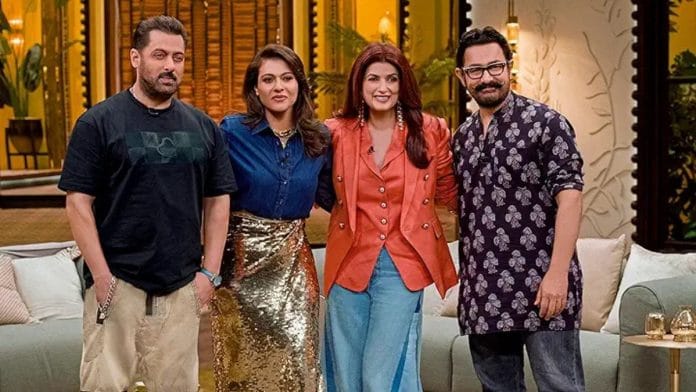Bollywood has long had a love affair with double standards. Aamir Khan — even after 13 years — still fumbles when asked difficult questions about gender dynamics, and Salman Khan isn’t any better. Both dodge, deflect, and serve up half-baked answers.
Back in 2012, during Talaash promotions, Aamir brushed aside the issue of pay disparity by claiming it wasn’t about gender but about profit-making potential, a remark that left co-stars Kareena Kapoor and Rani Mukerji visibly disappointed.
Now, years later, on the first episode of Two Much With Kajol and Twinkle, the Khans were confronted withanother hypocrisy: age gaps.
Men in their 50s and 60s romancing actresses half their age is not only normalised, it’s celebrated as “cinema magic.” The same industry that pairs Shah Rukh Khan with Alia Bhatt or Salman Khan with Pooja Hegde — women young enough to be their daughters — suddenly gets uncomfortable if a woman in her 40s is castopposite a younger man. Then it’s called “bold.”
When Kajol pointed this out, Aamir fell back on the usual “depends on the story” defense, citing Dil Chahta Hai as an example. When pressed about romancing much younger heroines himself, he played oblivious, until Kajol and Twinkle reminded him of Kareena Kapoor.
His further response: “Filmmaking is not real, you have to understand that. When you are dying, you are not actually dying. It has to look right.”
Salman, meanwhile, argued that casting choices depend on producers, freshness, and box-office appeal. When Kajol pushed back, noting the bias doesn’t work in reverse, Salman shrugged it off: “But aisi script hi kitni aati hai aap logon ke paas? (How many scripts like that do you receive?) If the film is good and the story is woven around something like that, an older woman and a younger man, I don’t think anyone would mind that.”
Learn from the West
Bollywood borrows endlessly from the West — scripts, intimacy in films and OTT shows, fashion, even lifestyle.
Yet when it comes to one thing it should borrow — casting older women opposite younger men — the industry digs in its heels. Suddenly “culture” and “morality” become the defense.
In The Idea of You (2024), Anne Hathaway plays a 40-year-old divorced mom falling for a 24-year-old pop star (Nicholas Galitzine). In A Family Affair (2024), Nicole Kidman (mid-50s) is cast opposite Zac Efron (mid-30s). And in Babygirl (2025), Kidman again leads, this time as a powerful CEO entangled with her much younger intern.
But in Bollywood, actresses are openly mocked for similar choices.
Back in 2011, it was Salman himself who mocked Katrina Kaif for working with younger co-stars. On Bigg Boss, he quipped: “You’ve already worked with Akshay Kumar, Salman Khan, all of us. Now you’ve moved on to Ranbir Kapoor and Imran Khan… going younger and younger, is it? Looking for someone even below that?”
To which Katrina sportingly replied: “Why not.”
The truth is, Bollywood is terrified of letting women age on screen, while men are allowed to marinate in experience and charm.
The problem isn’t the audience. It’s the gatekeepers — the producers, directors, and power brokers — who refuse to imagine women beyond the arbitrary “expiry date” of desirability they have stamped on them.
Men are ageless. Women are replaceable. That’s the rule Bollywood has lived by — and continues to enforce.
(Edited by Prashant)






